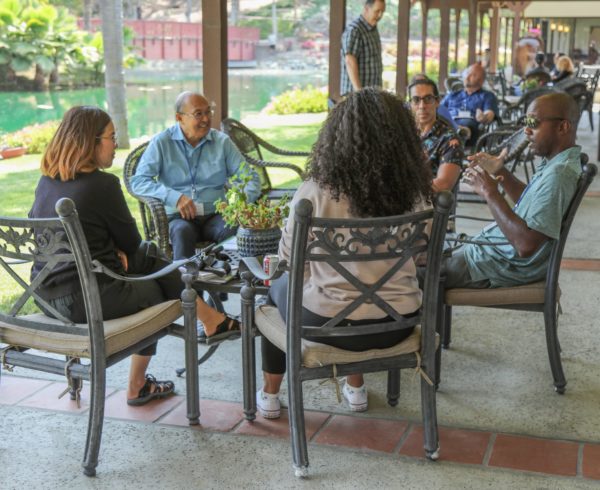Risky World
“Our world is full of potential risks.
Just getting out of bed, you and I face daily risks:
The risk of getting food poisoning.
The risk of a natural tragedy, depending on where we live (earthquakes, volcanos, tornados, hurricanes, flooding, and fires).
The risk of a car accident by driving on the highway.
The risk of getting sick or giving away sickness.
The risk of being misunderstood or misunderstanding others.
The risk of getting hurt yourself or hurting someone else.
The risk of just getting by and not living intentionally.
The risk of not making a difference in this precious world—both its effect on you and others in your life.
The risk of ____________________________ (you fill in the blank).
Risk language is often used in the business world. For example, when entrepreneurs envision starting a new business, they look at the financial “risks” involved like start-up costs, the locale of the storefront (or perhaps the website URL if it’s online) and the anticipated traffic at that locale (or how you plan to get traffic to your site if online), the competition with other similar businesses in your area of expertise, the unique service or product that their business will offer, anticipated monthly and yearly expenses versus anticipated revenue, and on and on the list goes.
In your personal finances, you might consider the risks involved in how you plan (or don’t plan) your financial future (whether or not you will save, invest—how you will invest, what you will invest in—how you budget your money, or just live by the seat of your pants).
When it comes to health, all of us also face a variety of potential risks every single day. From daily diet, to exercise (how much, how often, and how well), to how we deal with stress and worry, and other conflict management matters. How we face health issues or don’t face them involves risk.
The same is true in human relationships.
Life Lesson from Reuben Feffer
A few years ago, I watched the movie Along Came Polly.1 In the movie, a senior risk-assessment analyst for a life-insurance firm named Reuben Feffer (played by Ben Stiller) weighs the financial risks involved in insuring individuals. Stiller’s character not only weighs risks of insuring people for his company but is a very cautious person outside his job occupation as well, consistently calculating the risks of each activity of his day-to-day activities in order to avoid danger or harm.
While visiting an art exhibit with his longtime buddy, Sandy Lyle (played by Philip Seymour Hoffman), he runs into a former classmate from his junior high years, Polly Prince (played by Jennifer Aniston). Polly is very much a free spirit; she goes with the flow of life’s twists and turns, she’s flexible, and she’s not concerned about risk management as Reuben is. On their first date, he agrees to go with Polly to a restaurant that serves spicy ethnic cuisine even though he knows he probably shouldn’t be eating it due to his IBS (irritable bowel syndrome). From that point on, the rest of the movie focuses on their developing but awkward (and usually comical) relationship.
And yet, as comical as the story line of this film was, it also presented a sobering reality for the movie audience to ponder (and perhaps even celebrate):
all relationships involve varying degrees of risk.
The Possibility of Risk
One way to define risk is “the possibility of loss or injury.”2 In both the presence and absence of authentic relationships, we can experience possibilities of loss or injury. Here are just a few of those possibilities:
The possibility of loneliness.
The possibility of pain and hurt.
The possibility of disappointment.
The possibility of feeling rejection.
The possibility of not feeling appreciated (or loved).
The reality is that whether we presently have authentic relationships and friendships with others or not, we will likely experience any number of those emotions on that list at some point in life, as many of us know all too well having experienced them countless times in the past.
An unkind word was spoken.
A family member (or spouse) didn’t follow through on a promise or didn’t do something they said they would do.
Our attention was given elsewhere and someone we loved or cared about felt rejected.
Sometimes we were the cause (or influence) of those feelings rising up in others, and sometimes others were the cause (or influence) of those feelings rising up in us. The simple but profound part of life that we all deal with every single day is this:
human beings affect and influence one another.
But—and this is a big but—if risk involves possibilities of loss, doesn’t it also involve possibilities of gain? (You might want to reread that.)
I’m going to share a list of possibilities of gain in a moment. Let me first point out that you can only gain these possibilities below in relationships with others. You cannot experience them in isolation. Here they are:
The presence of another.
Connection.
Support.
Comradery.
Appreciation.
Affirmation.
Acceptance.
Love (Jesus style).
Being known.
Knowing others.
Sharing your hopes and dreams.
That is a short list. Feel free to add some other things to that list that you can think of.
When we frame risk and risk-taking from the perspective of the possibilities to be gained, the risks (possibilities of loss) involved seem minimal in comparison. Life lived in relationship/friendship with others is worth the risk, even more so when two or more people on the road toward an authentic Christianity pursue a meaningful relationship with one another.
So…is there value in risk? Absolutely.
Is there value in God creating a world that includes various elements, these possibilities, of risk?
Definitely.
Taking risks in relationships with others opens up possibilities to be gained.”
For “Risk” theology: Part 2, go here.
The above content is taken from a section of chapter six, “The risk of authenticity,” in my book Authentic Christianity: Why it matters for followers of Jesus (2018)







